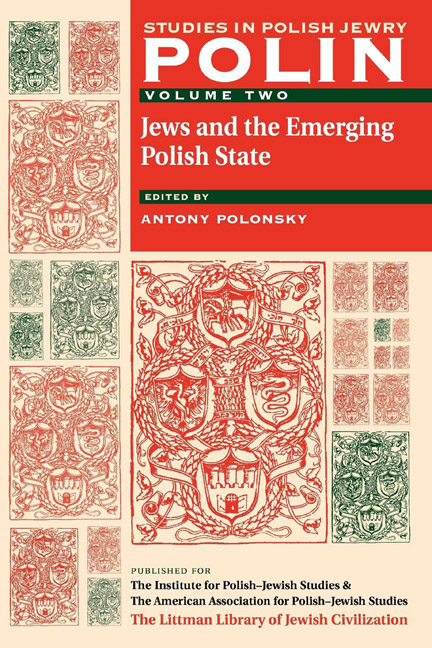Book contents
- Frontmatter
- Dedication
- Editors and Advisers
- Contents
- Polin: Studies in Polish Jewry
- Polin
- Statement From the Editors
- SYMPOSIUM: JEWS AND THE EMERGENCE OF AN INDEPENDENT POLISH STATE
- Lucien Wolf and the Making of Poland: Paris 1919
- The Dmowski-Namier Feud, 1915-1918
- History and Myth: Pinsk, April 1919
- Polish Diplomacy and the American-Jewish Community between the Wars
- Dmowski, Paderewski and American Jews (A Documentary Compilation)
- ARTICLES
- DOCUMENTS
- COMMENTARY
- REVIEW ESSAYS
- BOOK REVIEWS
- Leiter to the Editors
- Contributors
- Obituaries
History and Myth: Pinsk, April 1919
from SYMPOSIUM: JEWS AND THE EMERGENCE OF AN INDEPENDENT POLISH STATE
- Frontmatter
- Dedication
- Editors and Advisers
- Contents
- Polin: Studies in Polish Jewry
- Polin
- Statement From the Editors
- SYMPOSIUM: JEWS AND THE EMERGENCE OF AN INDEPENDENT POLISH STATE
- Lucien Wolf and the Making of Poland: Paris 1919
- The Dmowski-Namier Feud, 1915-1918
- History and Myth: Pinsk, April 1919
- Polish Diplomacy and the American-Jewish Community between the Wars
- Dmowski, Paderewski and American Jews (A Documentary Compilation)
- ARTICLES
- DOCUMENTS
- COMMENTARY
- REVIEW ESSAYS
- BOOK REVIEWS
- Leiter to the Editors
- Contributors
- Obituaries
Summary
Dedicated to Henry Rollet
Scientists know that the laws which govern the rμacrocosm are encoded in a single drop of water. Humanists are reluctant to employ such allembracing concepts, but even their disciplines deal with a range of matters, great and small, important and prosaic. Every great event leaves an imprint on the fate of ordinary people and, vice versa, great ‘historical’ events are the result of actions of people who are usually unaware that they are shaping history. For this reason, researchers often take particular interest in what seems to be a banal phenomenon and by studying it hope to penetrate the actual structure in which the phenomenon was able to come into being and take form. I write this in order to assure the reader that the subject of this article is in actual fact closely bound to the most essential problems involved in the establishment of Polish independence after the First World War, and also to the difficult and sensitive issues of Polish historiography as a whole.
I wjll begin by referring to some correspondence of 1971 between myself and Professor Marian Kukiel. My original letter to him was prompted by a book he had recently published on General Sikorski. I had never written about the book's hero but in working on contemporary history I had referred to other work by Kukiel. I had never had any personal contact with the author, but had felt grateful towards him for some time. I considered that making my own material available to him would be the best way of expressing my gratitude to a venerable scholar who was, for my generation, practically a living legend from the recent past. I had a particular detail in mind, concerning Sikorski's appointment in August 1919 as ‘commander of the Polesie division on the Lithuanian-Byelorussian front’ which, Kukiel suggested, was due to the particular significance of the Polesie region in the war then in progress. This statement seemed to me to be unjustified.
Of course, Polesie was of considerable strategic significance, as it became clear during spring 1920, when its marshy terrain forced the division into two groups of both the Soviet and Polish armies. Sikorski was certainly aware of the area's importance.
- Type
- Chapter
- Information
- Jews and the Emerging Polish State (Polin Volume Two) , pp. 50 - 72Publisher: Liverpool University PressPrint publication year: 2008

